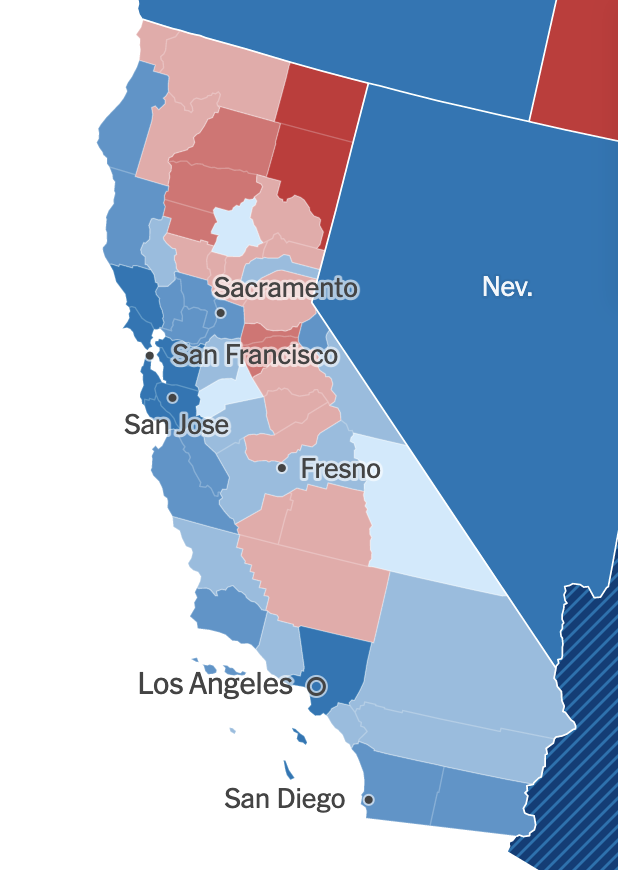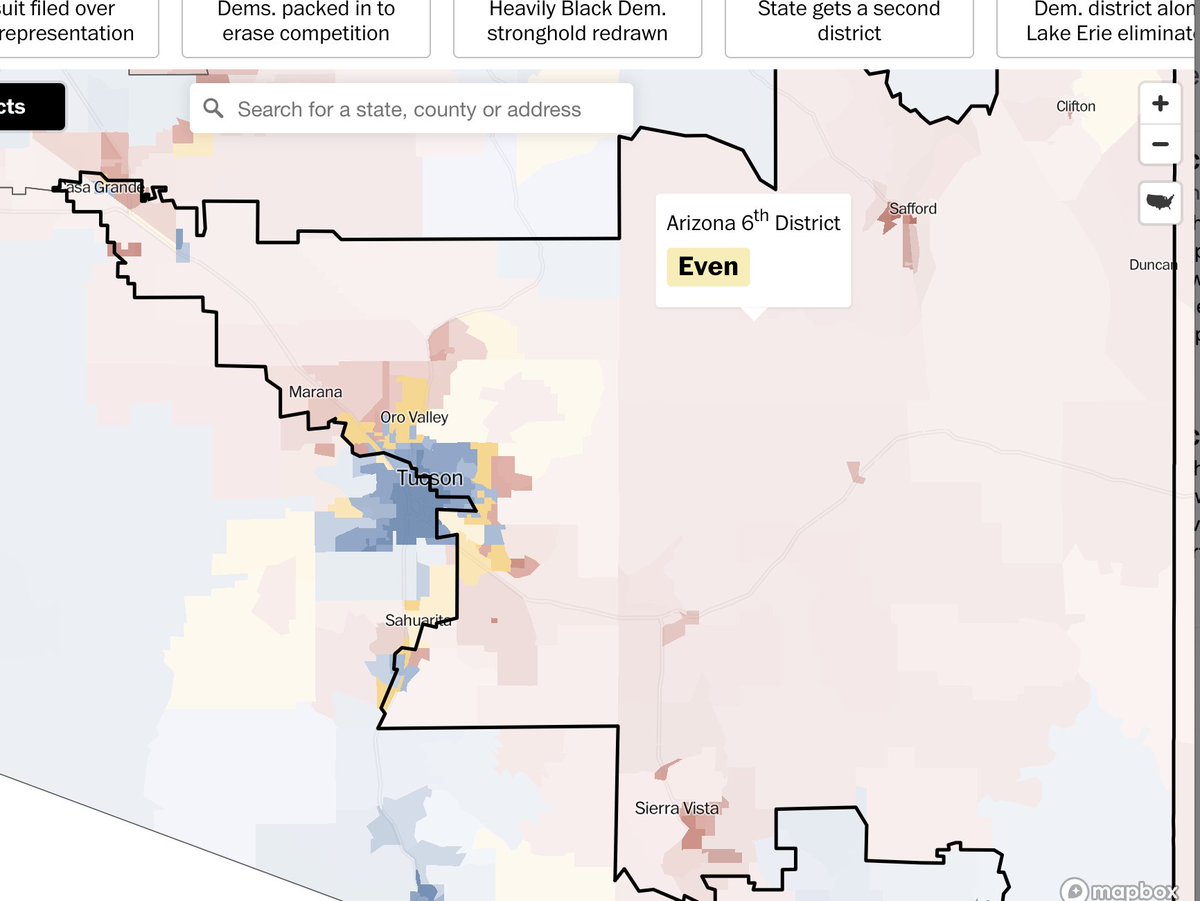
For the handful of you complaining that the commission-drawn California map is a gerrymander
https://twitter.com/donnermaps/status/1473389770428477441?s=20
This is a state Biden won by 30. I'm not saying Republicans should be grateful that they get districts, but no one should have any illusions about what a real gerrymander would mean for the CA GOP
There are lots of angry people insisting that California is a gerrymander. They don't even feel the need to argue it, because they think it's so obvious. (i think it's obvious the other way)
So before I explain my case, let me ask: why do you think California is a gerrymander?
So before I explain my case, let me ask: why do you think California is a gerrymander?
Here's a common one: proportionality. Dems got 65% of the major party vote; they get 80% of seats.
I understand that response, but in all seriousness: proportionality is a great criteria, especially in lopsided states. In fact, the GOP gets ~ fair share
I understand that response, but in all seriousness: proportionality is a great criteria, especially in lopsided states. In fact, the GOP gets ~ fair share
https://twitter.com/ChristianHeiens/status/1476313167705911312?s=20
Why? Districts represent geographic areas. In lopsided states, a party tends to nearly everywhere.
To take extreme ex, imagine a state where Reps won 70/30... but there was no place where Dems won.
There's no way you could draw 30% of dists for the Dems.
(WY/WV is an IRL ex)
To take extreme ex, imagine a state where Reps won 70/30... but there was no place where Dems won.
There's no way you could draw 30% of dists for the Dems.
(WY/WV is an IRL ex)
We can measure this phenomenon in a pretty simple way: what percentage of people *live* in Democratic precincts? what percentage *live* in Democratic counties?
That's slightly different than vote share, but it's the one that really informs this problem.
That's slightly different than vote share, but it's the one that really informs this problem.
You can imagine two states, for ex: one where Dems win 60/40 in every precinct (here we'd expect Dems to get all CDs), and one where Dems win 100% in 60% of precincts, and GOP wins 100% in 40% of precincts (here we'd expect the GOP to get a lot of CDs!)
What's the number for California? Well in 2020, 84% of votes were cast in Democratic precincts, even though Democrats won 64% of the vote (i'd guess the disparity is even greater using *people* not votes)
That means we expect Democrats to win a disproportionate number of seats.
That means we expect Democrats to win a disproportionate number of seats.
The same measure, btw, shows some of the challenges Democrats have in other states.
Only 44% of votes in Wisconsin were cast in Biden precincts! That's a huge part of their 'geography' problem, and why even a Dem draw would struggle to get to a 4-4 split
Only 44% of votes in Wisconsin were cast in Biden precincts! That's a huge part of their 'geography' problem, and why even a Dem draw would struggle to get to a 4-4 split
In the case of California, the 84% share of votes cast in Biden precincts happens to exactly line up with the... 84.6% of districts on the new map that Biden won.
Doesn't prove it's not a gerrymander, but it's a reason I don't think the proportionality argument is compelling
Doesn't prove it's not a gerrymander, but it's a reason I don't think the proportionality argument is compelling
We can look at it in terms of counties, too. Counties are a key building block for districts, and it captures something that precincts don't get: whether the precincts are grouped together in a way that lend themselves to effcient/inefficient districting
Well, 94% of votes in California live in counties that voted for Biden.
There just aren't many areas that obviously entitled to a CD at the county-level (kern, NoCal, east of Sacramento and to its south). And they all got CDs
There just aren't many areas that obviously entitled to a CD at the county-level (kern, NoCal, east of Sacramento and to its south). And they all got CDs

Counties may seem arbitrary, but jursidictional lines are one of the key criteria for nonpartisan map making. There are jurisdictions that obviously deserve a Democratic CD in other states that don't get one (Cobb, Ft. Worth TX, etc.). There's nothing quite like that here
40% of Ohio's population lives in Biden counties, and 36% live in Biden precincts. That would yield 5 or 6 Biden CDs, which is about what I get when I draw a map by nonpartisan standards. Current map is 4, though barely
https://twitter.com/HollaAtMeBerg/status/1476323317346979845?s=20
Looking at Texas, 52% of people live in Biden counties and 46% live in Biden precincts.
That would yield a pretty evenly divided congressional delegation, which is also what I get when I draw a map by nonpartisan standards
That would yield a pretty evenly divided congressional delegation, which is also what I get when I draw a map by nonpartisan standards
The other argument I see: a few cases (mainly Sacramento and CA-20) where people think the lines are bad for the Republicans, which I personally agree with!
The question is whether that makes it a gerrymander, and I don't think it adds up to one for two main reasons
The question is whether that makes it a gerrymander, and I don't think it adds up to one for two main reasons
First, there are plenty of cases where the Republicans should be quite happy with the lines, especially in southern California
If you've got a mix of favorable and unfavorable choices, with no obvious net partisan effect, I don't think it's easy to say there's a gerrymander
If you've got a mix of favorable and unfavorable choices, with no obvious net partisan effect, I don't think it's easy to say there's a gerrymander
And more generally, I think it is very hard to declare a gerrymander off of a few choices you don't like!
If Sacramento makes a gerrymander, is Arizona a GOP gerrymander because Tucson was split and denied Dems a seat they had before? No!
If Sacramento makes a gerrymander, is Arizona a GOP gerrymander because Tucson was split and denied Dems a seat they had before? No!

There were lots of Democrats on this website declaring Colorado a gerrymander because they don't like the new CO-8, which I absolutely would not have drawn myself.
Also not a gerrymander
Also not a gerrymander
And I'd note that in the scheme of the whole map, that these choices in CO-08 and AZ-06 go a lot further toward deciding the over all character of a map than one or two CDs out of 52 in California
And I'll add a third point: the magnitude of the choice is relevant. Yes, these choices in Sac/Fresno shore up two Dems (nevermind that the reverse could be true in SoCal in a few cases).
It's just not the same as outright denying a CD that a party is plainly entitled to
It's just not the same as outright denying a CD that a party is plainly entitled to
IF the Democrats had tried to deny the GOP a few CDs they could do so. They could potentially eliminate every one of them. But I'm not sure they've denied the GOP even a single CD that they're clearly entitled to, even if we conceded that the balance of choices work against them
One random closing thought here, aimed more at the reformist left. It's fashionable on this website to dismiss compactness in favor of other criteria, but the reactions to the California map are a reminder that... 

• • •
Missing some Tweet in this thread? You can try to
force a refresh



